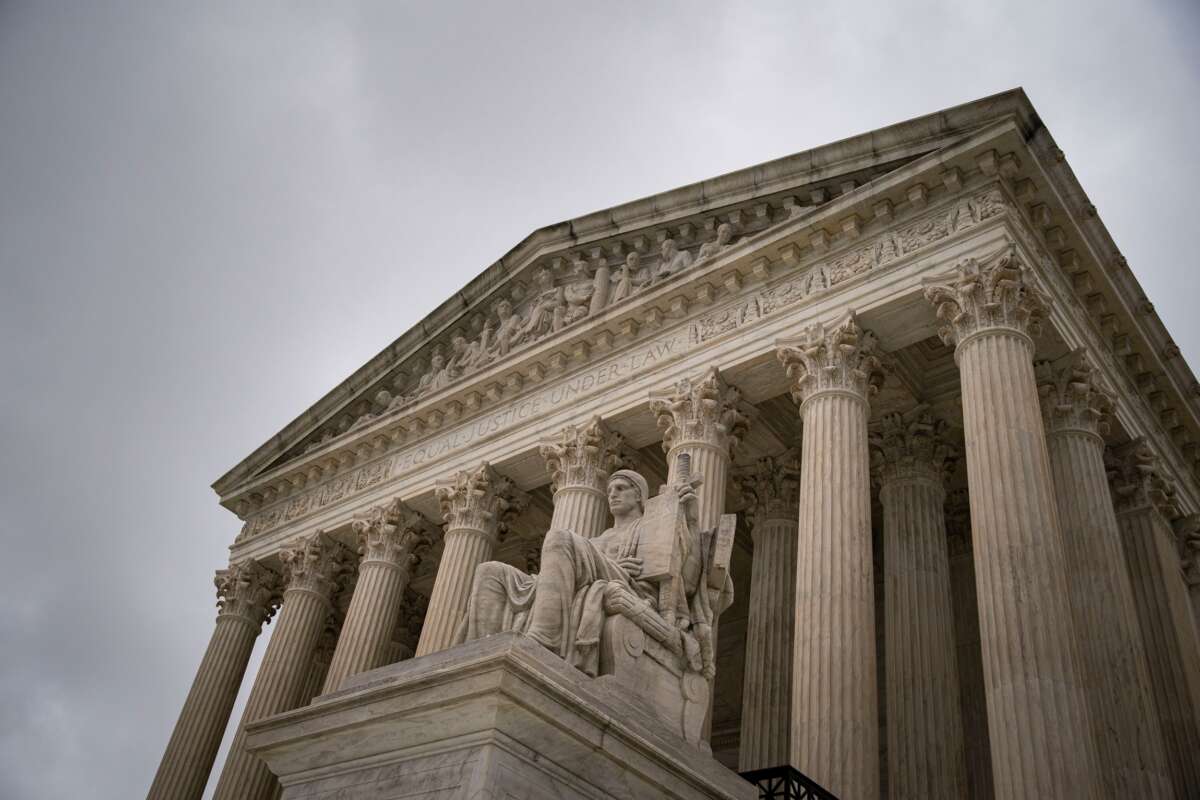Part of the Series
Voting Wrongs
Honest, paywall-free news is rare. Please support our boldly independent journalism with a donation of any size.
The United States Supreme Court ruled on Thursday to allow racial gerrymandering in the South Carolina congressional maps to remain in place, on the dubious grounds that Republicans had inadvertently created the problem while trying to make a partisan gerrymander.
In a 6-3 ruling along partisan lines, the conservative bloc of justices reversed a 2023 appellate court ruling that found Republicans had illegally moved Black voters out of a congressional district — what the lower court described as “bleaching”.
The majority opinion in the case, Alexander v. South Carolina State Conference of the NAACP, was written by Justice Samuel Alito, who alleged that the NAACP used “circumstantial” evidence that race was used when Republicans were drawing congressional lines.
There is no doubt that Black voters were indeed moved out of the district in question. But state Republican lawmakers had argued that they were, in fact, merely trying to draw a partisan gerrymander, and that, as a result, a significant number of Black residents (who tend to vote more Democratic) were moved out of the First Congressional District.
Alito and the conservative justices agreed with that reasoning.
“Because of the tight correlation between race and partisan preferences, this fact does little to show that race, not politics drove the legislature’s choice,” Alito reasoned.
Due to the ruling, the case is now remanded to the original district court where the maps were first challenged, and with the limits now imposed by the Supreme Court, the maps will likely be allowed to stand.
Alito’s opinion is particularly jarring, as the Court, for the first time, gives strong endorsement to the idea of partisan gerrymandering as a legal means to draw political maps. Previous rulings by the Court had allowed partisan gerrymandering to continue on, as there were no explicit parts of the Constitution forbidding it — however, within those rulings, the Court had deemed the practice uncouth and “incompatible with democratic principles.”
Justice Clarence Thomas, another member of the conservative bloc of justices, went further in his concurrence, agreeing with the outcome but suggesting that it was past time for the Supreme Court to stop intervening in cases dealing with racial gerrymanders.
“In my view, the Court has no power to decide these types of claims,” Thomas wrote. “Drawing political districts is a task for politicians, not federal judges.”
Writing a dissent on behalf of the three liberal members of the Court, Justice Elena Kagan disagreed with Alito’s dismissal of the challengers’ claims of racial gerrymandering, stating that they had “introduced more than enough evidence” to make their case.
The precedent created by the Court on Thursday will make future challenges all the more difficult, she added, noting that legislatures can now use partisan gerrymandering as a license to discriminate.
“In every way, the majority today stacks the deck against the Challengers. They must lose, the majority says, because the State had a ‘possible’ story to tell about not considering race — even if the opposite story was the more credible,” Kagan wrote.
Leaders of the South Carolina Conference of the NAACP castigated the ruling from the far right justices.
“Today, the Supreme Court has failed the American people. Voting rights have taken another gut punch, and the future of democracy in South Carolina is dangling by a thread,” said Brenda Murphy, President of the South Carolina State Conference of the NAACP. “Make no mistake – we are not backing down from this fight.”
Legal observers also scoffed at Alito’s reasoning, agreeing with Kagan that the ruling will lead to racial gerrymandering becoming more normalized under the guise of partisan redistricting.
“This disastrous ruling gives politicians the greenlight to racially gerrymander districts as they please,” voting rights organization Let America Vote stated in a post on X.
“We need immediate federal legislative reform to address this distortion in districting,” said Janai Nelson, president of NAACP Legal Defense and Educational Fund, reacting to the ruling.
Other commentators aimed their ire at Alito and Thomas specifically.
“Clarence Thomas signals he would end democracy if he could,” said Daily Kos elections writer Stephen Wolf. “Overturning equal population requirements would enable a level of gerrymandering far beyond today’s most extreme maps.”
“Justice Alito sounds deeply aggrieved that the plaintiffs would accuse the South Carolina legislature of racial gerrymandering,” Slate’s Mark Joseph Stern observed. “He seemingly views this accusation as a far, far greater offense than the legislature’s actual practice of diluting Black residents’ votes.”
A terrifying moment. We appeal for your support.
In the last weeks, we have witnessed an authoritarian assault on communities in Minnesota and across the nation.
The need for truthful, grassroots reporting is urgent at this cataclysmic historical moment. Yet, Trump-aligned billionaires and other allies have taken over many legacy media outlets — the culmination of a decades-long campaign to place control of the narrative into the hands of the political right.
We refuse to let Trump’s blatant propaganda machine go unchecked. Untethered to corporate ownership or advertisers, Truthout remains fearless in our reporting and our determination to use journalism as a tool for justice.
But we need your help just to fund our basic expenses. Over 80 percent of Truthout’s funding comes from small individual donations from our community of readers, and over a third of our total budget is supported by recurring monthly donors.
Truthout has launched a fundraiser to add 500 new monthly donors in the next 10 days. Whether you can make a small monthly donation or a larger one-time gift, Truthout only works with your support.
